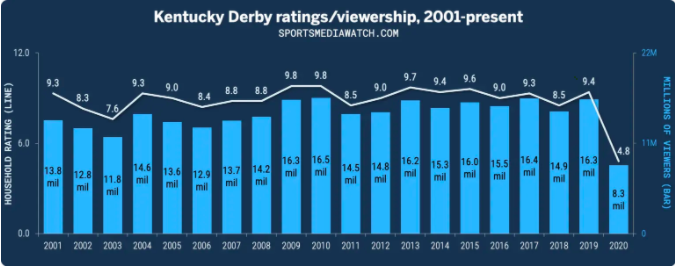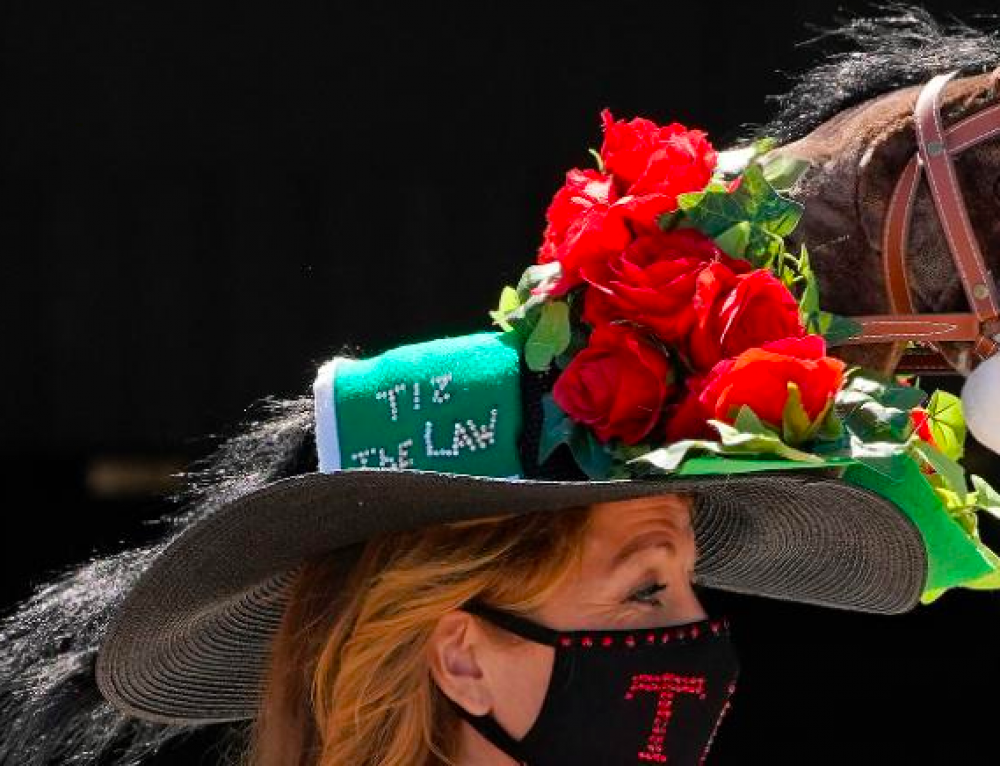Despite Kentucky Derby viewership and bets fell by nearly 50% from last year’s record handle, 2020’s race did about as well as possible under adverse circumstances.
The Kentucky Derby began in 1872 when Meriwether Lewis Clark, the grandson of American frontiersman William Clark traveled to Europe and became fond of the Grand Prix de Paris Longchamps, later returning to the United States inspired to create a similar horse racing spectacle. Since then, the competition has become a market valued at approximately 5.3 billion dollars, employing over 22,700 on the country. Traditionally, it has been held on the first Saturday of May, but as the coronavirus pandemic has rocked the nation and forced race organizers to postpone the contest, it was finally held on Saturday, September 6th with almost all spectators away and only select media, horsemen, and horsemen’s select guests were among those able to watch the race under the Twin Spires.
Only $126 million was generated across all sources on the 14 races at Churchill Downs in Louisville, Ky., meaning that this year’s Kentucky Derby card fell by nearly 50% from last year’s record handle. CNBC reported that the Derby was prepared to see an increase of 300% of wagers per minute the day of the race, as well as a 400% increase in new account registrations, but Derby numbers showed that the 2020 total handle was the lowest amount bet on the Derby Day card since 2002, when $123.2 million was bet on the day’s races. America’s premier and most lucrative race for 3-year old fillies (female horses) held each year on the day before the Kentucky Derby, also dropped to $30.8 million this year from $60.2 million in 2019. Betting on the Oaks itself went from $19.4 million in 2019 to $10 million on the event prior to the big Kentucky race. Fans again were not allowed at the track. Before the race, Tiz the Law, a horse that won the Belmont Stakes on June 20, was the 6-5 favorite to win the Kentucky Derby, while Honor A.P. had the second-best odds at 7-1, and Authentic, with Hall of Fame boricua jockey John Velazquez aboard, who was third at 8-1, was finally named champion of the 146th running of the Kentucky Derby.
Total viewership for horse racing went up 300% since the start of this year, according to Michael Mulvihill, Fox Sports’ executive vice president of research, league operations, and strategy. During August, BloodHorse reported that total consumption of horse racing has grown to 1.45 billion in 2020, up from 365 million at the same point a year ago. On the big day, Kentucky Derby reportedly averaged a 4.8 rating and 8.3 million viewers on NBC, per Nielsen fast-nationals — easily the smallest audience on record for the race (dating back to 1988). The last time viewership for this horse race was so low was back in 2000 when 9.1 million watched. Sports Media Watch saw ratings and viewership sink 49% from 2019’s 9.4 and 16.3 million, with the peak audience of 9.8 million down 47% from last year’s unusual postrace peak of 18.5 million. The Derby also averaged an additional streaming audience of 133,000, a record for horse racing on NBC. The final race in the Triple Crown, the Preakness Stakes, is slated for October 3 at Pimlico Race Course in Baltimore, Maryland.
As good as it gets
Despite the steep decline and historic low for the Derby, it ranks as the highest rated and most-watched sportscast since the NFL Draft in April, writes Sports Media Watch, as previous highs were reported at an average of 3.7 and 6.34 million viewers, which is something achieved by NASCAR’s return at Darlington in May, considering also that leagues like the NBA have seen double-digit declines in TV viewership across the country. The 2020 Kentucky Derby also ranked as the most-watched Labor Day weekend sporting event since an Alabama-Florida State college football game three years ago.
“Although it is difficult to compare the financial performance to prior years, we are pleased with the profitability of the spectator-less 2020 Derby Week,” read a statement by Louisville horse racing complex Churchill Downs, who attributed the drop off due partly to the empty grandstand and infield. “The decline in handle for this year’s Derby Day program is attributable to the lack of on-track wagering, fewer horses per race, including in the Kentucky Derby race, and a prohibitive favorite in the Derby race.”
Activists demanding justice for Breonna Taylor protested on Kentucky Derby Day.














